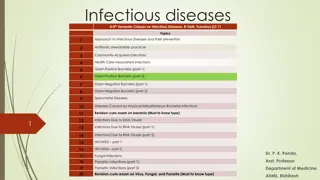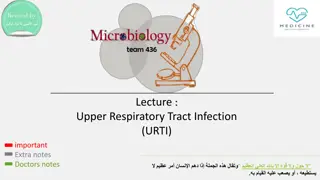Overview of Corynebacterium: Characteristics, Infections, and Laboratory Diagnostics
Corynebacterium is a genus of Gram-positive rod-shaped bacteria widely distributed in nature. They are catalase positive, non-spore-forming, non-motile bacteria with unique morphological features. The most notable human infection caused by Corynebacterium is diphtheria, characterized by the formatio
0 views • 25 slides
Infectious Diseases 4/5th Semester Classes: Approach & Prevention
Infectious Diseases class focuses on various topics including Antibiotic Stewardship Practices, Community-Acquired Infections, Gram-Positive and Gram-Negative Bacteria, Spirochetal Diseases, Diseases Caused by Bacterial and Viral Infections, HIV/AIDS, Fungal and Parasitic Infections. The class also
3 views • 30 slides
Understanding Upper Respiratory Tract Infections (URTI) in Children
This informative lecture covers the epidemiology, clinical presentations, common etiological agents, and laboratory diagnosis of upper respiratory tract infections (URTI) in children. Topics discussed include pharyngitis, diphtheria, epiglottitis, pertussis, acute otitis media, sinusitis, and other
0 views • 16 slides
Overview of Corynebacterium diphtheriae Pathogenesis and Virulence Factors
Corynebacterium diphtheriae is a non-spore forming Gram-positive bacillus responsible for causing diphtheria in humans. This bacterium, particularly C. diphtheriae, is known for producing a potent exotoxin called diphtheria toxin, which blocks protein synthesis and leads to serious complications suc
0 views • 25 slides
Understanding Bacterial Toxins: Production, Types, and Effects
Explore the world of bacterial toxins, focusing on production mechanisms, various types such as cytotoxins and their effects on host cells. Delve into specific examples like Diphtheria Toxin caused by Corynebacterium diphtheriae, understanding its biological features and the disease it leads to.
0 views • 13 slides
Overview of Laryngeal Inflammations in Pediatric Patients
This comprehensive overview covers various inflammations of the larynx in pediatric patients, including laryngotracheitis, supraglottitis, diphtheria, chronic non-specific laryngitis, tuberculosis (TB), scleroma, and voice-induced disorders. It discusses causes, symptoms, diagnostic features, treatm
0 views • 10 slides





